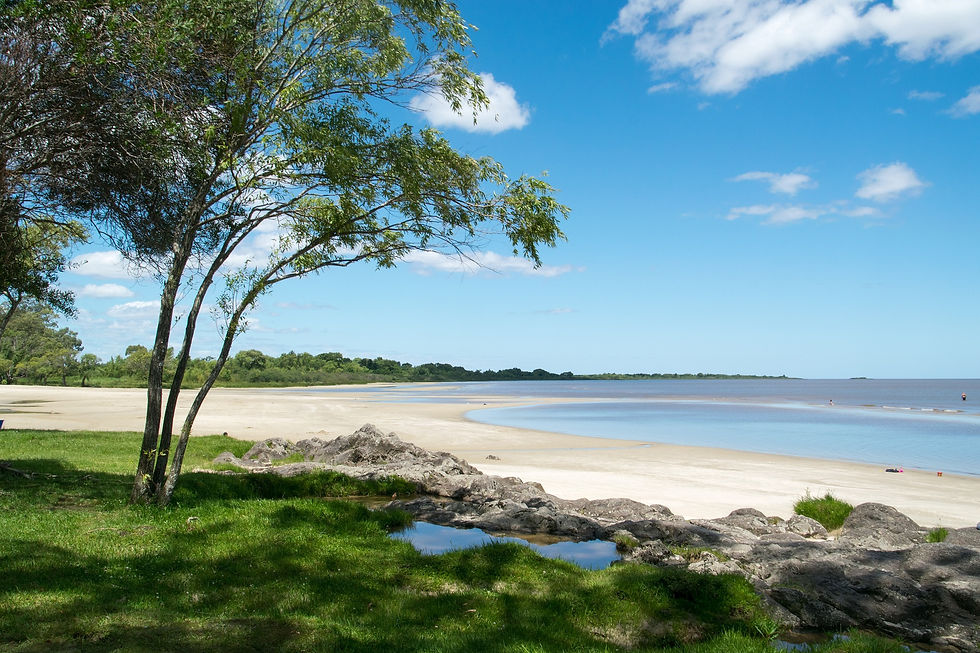
Stable & Secure
Uruguay is known for its political stability, legal security, low crime rates and overall peaceful atmosphere - which, generally speaking, makes it an attractive environment for investment and property.
The country has a long tradition of democratic governance with regular, free and fair elections and peaceful transitions of power. The high level of education and a well-educated population contribute to political stability. Uruguay is a member of international organizations such as Mercosur and the United Nations, which promotes international cooperation and strengthens political stability.

Safe & Supported Investment Environment
The government of Uruguay wants to promote the country's economic growth and is driving this forward by actively supporting investors and companies. Numerous government programs are available accordingly. This is one of the reasons why Uruguay is considered a leader in Latin America in terms of its investment and economic climate.
In the country, immutable rights apply within the framework of property regulations. The recognition of ownership takes place through an official title of ownership, which is usually secured by notarized public documents.
Foreigners are treated completely without discrimination when purchasing land or real estate, without any restrictions. In addition, foreigners have the same rights/responsibilities as citizens of Uruguay. The land registry in Uruguay is considered one of the most reliable in Latin America.
To purchase real estate in Uruguay, a foreigner only needs their passport or ID card. Uruguay residency is not required.
_edited.png)
.webp)
Emerging Land & Property Market
The Uruguayan real estate market is set for continued growth and resilience. The country's stable economy, investor-friendly incentives and diverse investment opportunities suggest continued interest from domestic and foreign buyers.
In Uruguay, the real estate market is currently experiencing a trend in which demand for exclusive residential properties by the sea, i.e. near the coast, is on the rise. The market is expected to have an annual growth rate (CAGR 2024-2028) of 4.74%.

Tax Advantages
Uruguay offers various tax incentives for foreign investors, including a tax-free period of 5 years for investments in real estate up to US$ 380,000. Anything above this is tax-free for 10 years.
Income from abroad is not taxed (apart from interest and dividend payments, but only after 10 years of residency in Uruguay).
Only income from activities that take place within Uruguay is subject to taxation. The general tax rate for capital gains (e.g. also profits from the sale of real estate) and holding profits is 12% for both tax residents and non-residents.
Similar to Switzerland, Uruguay has strict banking secrecy laws and a tax system that is very favorable to foreign investors.


Uruguay can produce food for
30 million
people
people but has the potential to feed
50 million
people
Lots of Space for the Individual
Uruguay is sparsely populated. 3.4 million inhabitants, but only half the size of Germany with its around 83 million citizens. Compared to the UK, each resident in Uruguay has around 14 times more space.
Compared to the whole of Europe, there is on average around 3.5 times more space for peace and development and compared to Chile or Brazil, there is still around 25% more space.

High Quality of Life, Culture & Hospitality
Uruguay offers the right environment for a relaxed lifestyle, has a rich culture and a functioning health and education system.
The hospitality of the people here makes it easy to quickly feel at home in this country. Uruguayans are generally considered to be honest, friendly and reliable. They are true to their word, which sometimes seems to be reflected in the overall relaxed atmosphere in the country.
Uruguay repeatedly features in the rankings of the "Top 10 countries for retirement living" ("International Living", USA).

Climate
Uruguay's climate is moderate - with warm summers and mild winters. There are numerous beaches and picturesque coastal towns along the approximately 660 kilometers of coastline on the Atlantic Ocean and Río de la Plata.
The country is rich in natural beauty, including extensive beaches, crystal-clear waters and green landscapes. Average temperatures are 17°C in spring, 28°C in summer, 18°C in fall and 12°C in winter.
Most days of the year are sunny and fall days are often accompanied by clear blue skies.

Modern Infrastructure & Good Accessibility
Uruguay has a well-developed transportation system with ports, highways and airports, which facilitates accessibility and increases the attractiveness of land and real estate accordingly. Telephone and broadband services are reliable and cover the country well.
_edited.jpg)
Agribusiness | The Family Offices darling
Uruguay's agricultural sector is a crucial and dynamic part of its economy, contributing 7.3% to the GDP and accounting for 60% of the country's goods exports. Additionally, about 82% of Uruguay's national territory is utilized for agriculture, a significantly higher proportion compared to the Latin American average of less than 40%.


Visitor-Friendly Immigration Policy
With its open immigration policy, Uruguay offers various options for foreign investors to obtain a residence permit or citizenship, which further increases the country's attractiveness for land or real estate buyers.
Uruguay has an easy residency process requiring proof of income and a clean criminal record. Citizenship can be applied for after five years of legal residency, or three years if married to a Uruguayan, making it an attractive option compared to many other countries.


Highest internet penetration rate in Latin America
Food & Groceries
Uruguay's food culture is strongly characterized by asados - traditional barbecues. These barbecues are known for their first-class meat, which is grilled over an open fire. They are accompanied by tasty Uruguayan wines, especially the strong Tannat wines, which go perfectly with grilled meat dishes. Craft beer has also gained popularity in recent years, with many local breweries offering innovative and high-quality beers.
The food culture reflects the warmth and community orientation of Uruguayans, who value and celebrate eating and drinking together.

Digitalization
Uruguay is very technology-conscious, has one of the highest literacy rates in South America (over 98%), the telecommunications network is 100% digital. The internet penetration rate is also one of the highest in Latin America (90%).
Uruguay is one of the first countries in Latin America in terms of Internet access, mobile Internet speed and the percentage of households and businesses connected to the fiber optic network nationwide.
Uruguay is home to one of the best data centers in Latin America and has several undersea Internet cable connections with the USA. Uruguay also ranks first in Latin America in the eGovernment Development Index. Even in the town of Jose Ignacio, fiber optic lines for fast internet are laid and available throughout the area.
The government of Uruguay is planning extensive further investments in infrastructure, technology, modernization systems, the expansion of connectivity, and other new digital services.
(Source: International Trade Administration USA Gov.)

Health System
Uruguay's ratio of doctors to population is the second highest in Latin America and 17th highest in the world.
Uruguay operates a national health system that provides health services to all citizens and residents, regardless of income or social status.
Health expenditure accounts for 9 percent of GDP and is expected to grow strongly to 10 percent of GDP (equivalent to around U$ 11 billion) by 2027.

Separation of Church & State
The Uruguayan constitution of 1917 makes it clear that the state is secular and has no official state religion. These principles are reinforced by various legal provisions that ensure the separation of religious institutions and state affairs.
The public education system in Uruguay is also secular. Public schools are not allowed to conduct religious education or ceremonies. Religious education is left to private institutions and families.
Religious institutions also play no official role in the political arena or in legislation. Political decisions are made on the basis of secular principles and laws, without religious influence.

